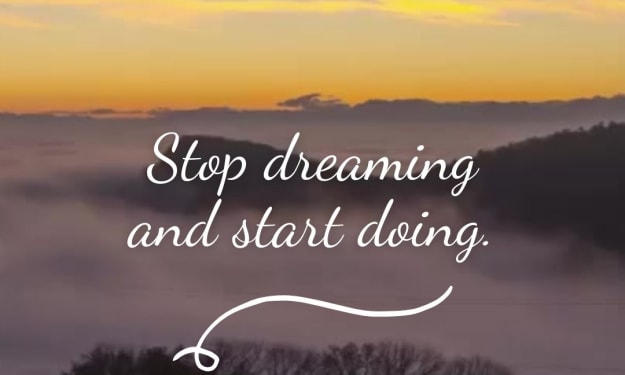MOTIVATION
TRUST YOURSELF YOU CAN DO THIS

Motivation is the reason for which humans and other animals initiate, continue, or terminate a behavior at a given time. Motivational states are commonly understood as forces acting within the agent that create a disposition to engage in goal-directed behavior. It is often held that different mental states compete with each other and that only the strongest state determines behavior.[1] This means that we can be motivated to do something without actually doing it. The paradigmatic mental state providing motivation is desire. But various other states, such as beliefs about what one ought to do or intentions, may also provide motivation. Motivation is derived from the word 'motive', which denotes a person's needs, desires, wants, or urges. It is the process of motivating individuals to take action in order to achieve a goal. The psychological elements fueling people's behavior in the context of job goals might include a desire for money.
Definition
"Motivation" is commonly defined as what explains why people or animals initiate, continue or terminate a certain behavior at a particular time.[5][6][7][8] Motivational states come in various degrees of strength. The higher the degree, the more likely it is that the state has an influence on behavior.[9] This is often linked to forces acting from within the agent that result in goal-directed behavior.[6][10] One problem with defining motivation in terms of internal forces is that it is very difficult to measure them, which is why empirically-minded theorists often prefer definitions that are more closely linked to observable behavior.[11][10] One approach is to define motivation in terms of the flexibility of the animal's behavior. This flexibility involves goal-directed behavior that changes as the animal learns through new experiences.[12] Rats, for example, can learn to traverse through complicated mazes in order to satisfy their hunger. The feeding behavior of flies, on the other hand, is not flexible in this sense. On this view, we are justified to ascribe motivational states to rats but not to flies.[12] But it has been argued that there are cases of motivation without flexible behavior. A totally paralyzed person, for example, could still have motivation despite being unable to engage in behavior. This means that flexibility may still be a sufficient but not a necessary mark of motivation.[12] Some definitions stress the continuity between human and animal motivation but others draw a clear distinction between the two. This is often motivated by the idea that human agents act for reasons and commit themselves to the intentions they form while animals just follow their strongest desire.[13][10] Causalist definitions stress the causal relation between motivation and the resulting behavior. Non-causalist definitions, on the other hand, hold that motivation explains behavior in a non-causal way.
Motivation and mental states
Behaviorists have tried to explain motivation solely in terms of the relation between the situation and external, observable behavior. But the same entity often behaves differently despite being in the same situation as before. This suggests that explanation needs to make reference to internal states of the entity that mediate the link between stimulus and response.[12][15] Among these internal states, psychologists and philosophers are most interested in mental states. The paradigmatic mental state providing motivation is desire. But it has been argued that various other states, such as beliefs about what one ought to do or intentions, can also provide motivation.[15][13] The absence of motivation might result in mental diseases like depression.
An important distinction is between states that provide motivation whenever they are present, sometimes referred to as "essentially motivation-constituting attitudes" while other states provide motivation contingent on certain circumstances or other states.[15][16] It has been argued that a desire to perform an action, a so-called action-desire, always provides motivation.[15][16] This is even the case if the agent decides against performing the action because there are other more pressing issues.[12] An instrumental belief about how to reach a certain goal, on the other hand, provides motivation contingent on the agent currently having this goal. We can desire many things besides actions, like that our favorite soccer team wins their next match or that world peace is established.[15] Whether these desires provide motivation depends, among other things, on whether the agent has the ability to contribute to their realization. While some theorists accept the idea that desire is essential to motivation, others have argued that we can act even without desires.[15][16] The motivation may instead be based, for example, on rational deliberation. On this view, attending a painful root canal treatment is in most cases motivated by deliberation and not by a desire to do so.[17] So desire may not be essential to motivation.[16] But it is open to opponents of the thesis that there is motivation without desires to reject the analysis of such examples. Instead, they may argue that attending the root canal treatment is desired in some sense, even if there is also a very vivid desire present against doing so.
Another important distinction is between occurrent and standing desires. Occurrent desires are either conscious or otherwise causally active, in contrast to standing desires, which exist somewhere in the back of one's mind. If Dhanvi is busy convincing her friend to go hiking this weekend, for example, then her desire to go hiking is occurrent. But many of her other desires, like to sell her old car or to talk with her boss about a promotion, are merely standing during this conversation. Only occurrent desires can act as sources of motivation.[17][18][19] But not all occurrent desires are conscious. This leaves open the possibility of unconscious motivation.
Some psychological theories claim that motivation exists purely within the individual, but socio-cultural theories express motivation as an outcome of participation in actions and activities within the cultural context of social groups.
Strength of desire and action
Some theorists, often from a Humean tradition, deny that states other than desires can motivate us.[13] When such a view is combined with the idea that desires come in degrees, it can naturally lead to the thesis that we always follow our strongest desire.[22][11] This theory can be modified in the way that we always follow the course of action with the highest net force of motivation. This accounts for cases where several weaker desires all recommend the same course of action and together trump the strongest desire.[23][11] Various types of objections have been raised against this thesis. Some base their arguments on the assumption that we have free will, meaning that it is up to the agent what we do. From this position, it is natural to reject a point of view that lets behavior be determined by desires and not by the agent.[11][24] Others point to counterexamples, like when the agent acts out of a sense of duty even though he has a much stronger desire to do something else.[25] One line of argumentation holds that there is an important difference between the motivation based on a desire and an intention to act: an intention involves some kind of commitment to or identification with the intended course of action. This happens on the side of the agent and is not present in regular desires. This approach can be combined with the view that desires somehow contribute to the formation of intentions based on their strength. It has been argued that this distinction is important for the difference between human agency and animal behavior. On this view, animals automatically follow their strongest desire while human agents act according to their intention which may or may not coincide with their strongest desire.






Comments
There are no comments for this story
Be the first to respond and start the conversation.